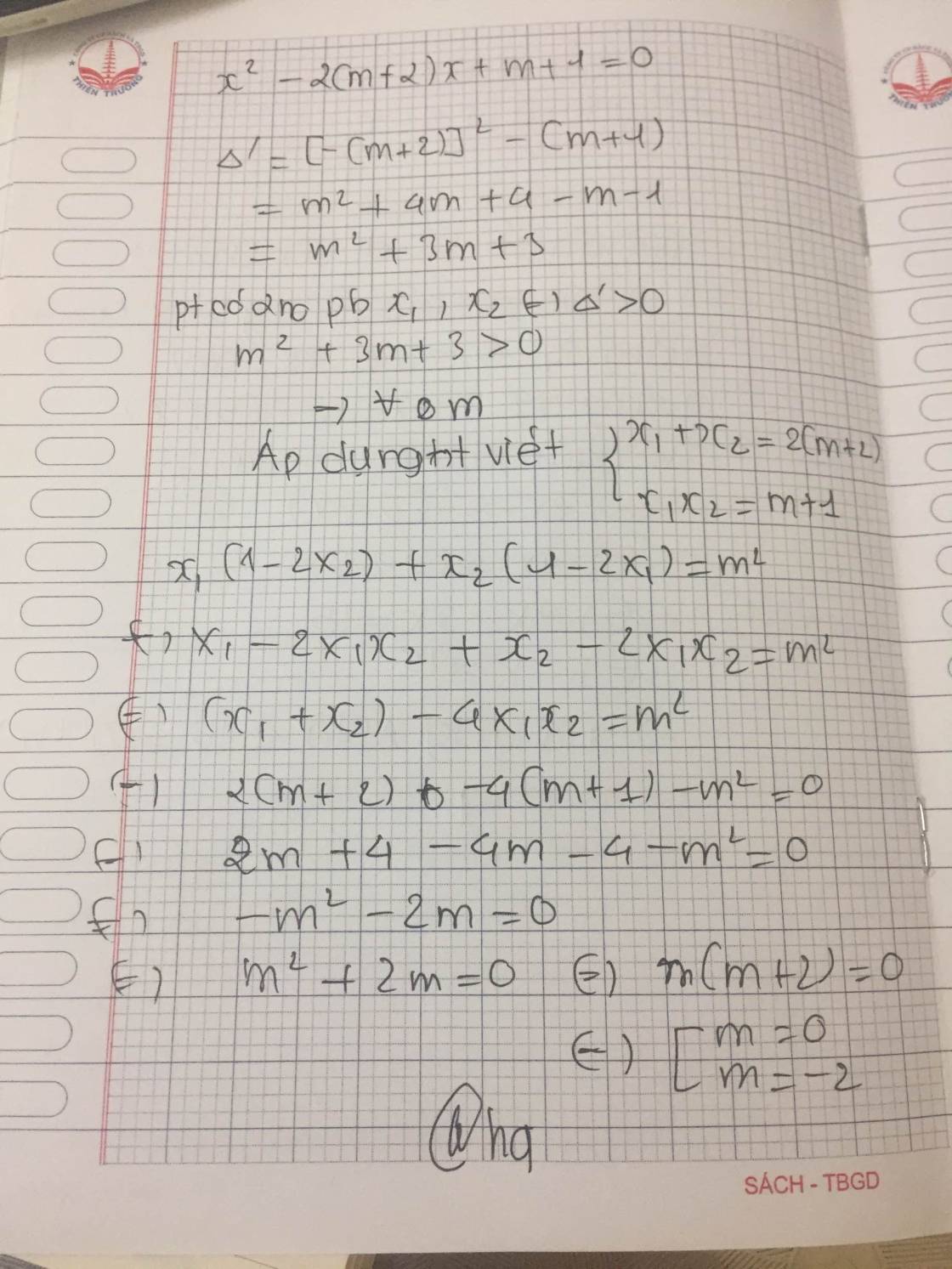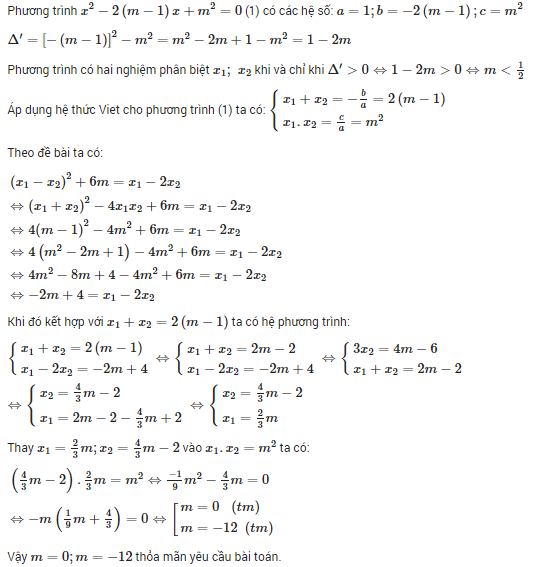Hãy nhập câu hỏi của bạn vào đây, nếu là tài khoản VIP, bạn sẽ được ưu tiên trả lời.



a: Thay m=-2 vào hệ phương trình, ta được:
\(\left\{{}\begin{matrix}x-2y=-2+1=-1\\-2x+y=3\cdot\left(-2\right)-1=-7\end{matrix}\right.\)
=>\(\left\{{}\begin{matrix}2x-4y=-2\\-2x+y=-7\end{matrix}\right.\Leftrightarrow\left\{{}\begin{matrix}-3y=-9\\x-2y=-1\end{matrix}\right.\)
=>\(\left\{{}\begin{matrix}y=3\\x=2y-1=2\cdot3-1=5\end{matrix}\right.\)
b: Để hệ có nghiệm duy nhất thì \(\dfrac{1}{m}\ne\dfrac{m}{1}\)
=>\(m^2\ne1\)
=>\(m\notin\left\{1;-1\right\}\)
\(\left\{{}\begin{matrix}x+my=m+1\\mx+y=3m-1\end{matrix}\right.\)
=>\(\left\{{}\begin{matrix}x=m+1-my\\m\left(m+1-my\right)+y=3m-1\end{matrix}\right.\)
=>\(\left\{{}\begin{matrix}x=m+1-my\\m^2+m-m^2y+y=3m-1\end{matrix}\right.\)
=>\(\left\{{}\begin{matrix}x=m+1-my\\y\left(-m^2+1\right)=3m-1-m^2-m=-m^2+2m-1\end{matrix}\right.\)
=>\(\left\{{}\begin{matrix}x=m+1-my\\y\left(m-1\right)\left(m+1\right)=\left(m-1\right)^2\end{matrix}\right.\)
=>\(\left\{{}\begin{matrix}y=\dfrac{m-1}{m+1}\\x=m+1-m\cdot\dfrac{m-1}{m+1}=\left(m+1\right)-\dfrac{m^2-m}{m+1}\end{matrix}\right.\)
=>\(\left\{{}\begin{matrix}y=\dfrac{m-1}{m+1}\\x=\dfrac{m^2+2m+1-m^2+m}{m+1}=\dfrac{3m+1}{m+1}\end{matrix}\right.\)
\(x^2-y^2=4\)
=>\(\dfrac{\left(3m+1\right)^2-\left(m-1\right)^2}{\left(m+1\right)^2}=4\)
=>\(\dfrac{9m^2+6m+1-m^2+2m+1}{\left(m+1\right)^2}=4\)
=>\(8m^2+8m+2=4\left(m+1\right)^2\)
=>\(8m^2+8m+2-4m^2-8m-4=0\)
=>\(4m^2-2=0\)
=>\(m^2=\dfrac{1}{2}\)
=>\(m=\pm\dfrac{1}{\sqrt{2}}\)

a) Pt có hai nghiệm trái dấu \(\Leftrightarrow ac< 0\Leftrightarrow m< 0\)
b) Pt có nghiệm khi \(\Delta\ge0\Leftrightarrow36-4m\ge0\Leftrightarrow m\le9\)
Áp dụng hệ thức viet có:
\(\left\{{}\begin{matrix}x_1+x_2=6\left(1\right)\\x_1x_2=m\left(2\right)\end{matrix}\right.\)
Từ (1) kết hợp với điều kiện có:\(\left\{{}\begin{matrix}x_1+x_2=6\\x_1-2x_2=m\end{matrix}\right.\)\(\Leftrightarrow\left\{{}\begin{matrix}3x_2=6-m\\x_1+x_2=6\end{matrix}\right.\)\(\Leftrightarrow\left\{{}\begin{matrix}x_2=\dfrac{6-m}{3}\\x_1=6-x_2=\dfrac{12+m}{3}\end{matrix}\right.\)
\(\Rightarrow x_1x_2=\dfrac{6-m}{3}.\dfrac{12+m}{3}=m\)
\(\Leftrightarrow72-15m-m^2=0\)
\(\Delta=3\sqrt{57}\)
\(\Rightarrow m=\dfrac{-15\pm3\sqrt{57}}{2}\) (thỏa mãn)
Vậy...

a: Th1: m=0
=>-2x-1=0
=>x=-1/2
=>NHận
TH2: m<>0
Δ=(-2)^2-4m(m-1)=-4m^2+4m+4
Để phương trình có nghiệm duy nhất thì -4m^2+4m+4=0
=>\(m=\dfrac{1\pm\sqrt{5}}{2}\)
b: Để PT có hai nghiệm phân biệt thì -4m^2+4m+4>0
=>\(\dfrac{1-\sqrt{5}}{2}< m< \dfrac{1+\sqrt{5}}{2}\)

Để pt có nghiệm \(\Leftrightarrow\Delta\ge0\Leftrightarrow4-4\left(m-1\right)\ge0\)\(\Leftrightarrow2\ge m\)
Theo viet: \(\left\{{}\begin{matrix}x_1+x_2=2\left(1\right)\\x_1x_2=m-1\end{matrix}\right.\)
\(x_1^4-x_1^3=x_2^4-x_2^3\)
\(\Leftrightarrow\left(x_1^4-x_2^4\right)-\left(x_1^3-x_2^3\right)=0\)
\(\Leftrightarrow\left(x_1-x_2\right)\left(x_1+x_2\right)\left(x_1^2+x_2^2\right)-\left(x_1-x_2\right)\left(x_1^2+x_1x_2+x_2^2\right)=0\)
\(\Leftrightarrow\left(x_1-x_2\right)\left[2\left(x_1^2+x_2^2\right)-x_1^2-x_1x_2-x_2^2\right]=0\)
\(\Leftrightarrow\left(x_1-x_2\right)\left(x_1^2+x_2^2-x_1x_2\right)=0\)
\(\Leftrightarrow x_1-x_2=0\) (2) ( vì \(x_1^2-x_1x_2+x_2^2>0;\forall x,y\))
Từ (1) (2) \(\Rightarrow x_1=x_2=1\)
\(\Rightarrow x_1x_2=m-1=1\) \(\Leftrightarrow m=2\) (Thỏa)
Vậy...

Lời giải:
Để pt có 2 nghiệm pb thì:
$\Delta'=1-(2-m)=m-1>0\Leftrightarrow m>1$
Áp dụng định lý Viet: \(\left\{\begin{matrix} x_1+x_2=2\\ x_1x_2=2-m\end{matrix}\right.\)
Khi đó:
$2x_1^3+(m+2)x_2^2=5$
$\Leftrightarrow 2x_1^3+(2x_1+2x_2-x_1x_2)x_2^2=5$
$\Leftrightarrow 2(x_1^3+x_2^3)+x_1(2-x_2)x_2^2=5$
\(\Leftrightarrow 2[(x_1+x_2)^3-3x_1x_2(x_1+x_2)]+x_1^2x_2^2=5\)
\(\Leftrightarrow 2[8-6(2-m)]+(2-m)^2=5\)
\(\Leftrightarrow m^2+8m-9=0\Leftrightarrow (m-1)(m+9)=0\)
Vì $m>1$ nên không có giá trị nào của $m$ thỏa mãn.


